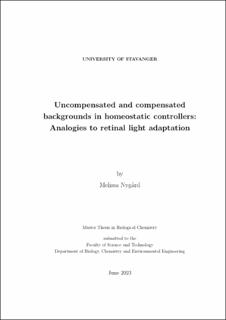| dc.description.abstract | Integral controllers with single negative feedbacks were subjected to a step-perturbation at constant but different backgrounds. Response amplitudes of the controlled variable, here called A, decreased monotonically with increasing backgrounds, which was opposed and corrected for by compensatory actions of the manipulated variable E. The controllers divided equally into two classes, in which the compensatory fluxes were either based on derepression or activation. Controllers with derepression-based compensatory fluxes showed decreased sensitivity but accelerated response kinetics, which is analogous to the resetting kinetics seen in vertebrate photoreceptors. Retinal light adaptation also involves compensating backgrounds according to remarks in the literature. We therefore became interested in understanding the underlying feedback mechanisms of background compensation. As such, we created controllers or oscillators that show robust background compensation independent of the applied background. These controllers need a second feedback layer, where the additional integral controllers (I1 and I2) feed directly or coherently back to the controlled variable. These feedback conditions were termed "coherent feedback" in analogy to a similar feedback mechanism used in quantum control theory and optics. Finally, simple three-neuron retinal light adapation (RLA) models, representing the retina as a whole, were subjected to the same perturbations. It was the feedback organization in the two-layered oscillator that was responsible for eliminating backgrounds. Robust background compensation, here described theoretically, could be of interest in terms of regulatory properties. Although, no biological relevanse of the concept has been identified. | |
